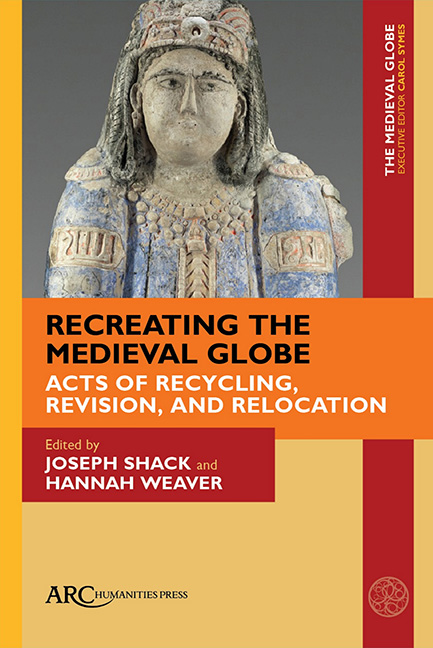Book contents
- Frontmatter
- Contents
- List of Illustrations
- Introduction to Recreating the Medieval Globe: Acts of Recycling, Revision, and Relocation
- Self-Revision and the Arabic Historical Tradition: Identifying Textual Reuse and Reorganization in the Works of al-Balādhurī
- When Curtains Fall: A Shape-Shifting Silk of the Late Abbasid Period
- Salvaging Meaning: The Art of Recycling in Sino-Mongol Quanzhou, ca. 1276–1408
- Recontextualizing Indigenous Knowledge on the Prussian–Lithuanian Frontier, CA. 1380–1410
- Meubles: The Ever Mobile Middle Ages
- Reflection
- Index
Salvaging Meaning: The Art of Recycling in Sino-Mongol Quanzhou, ca. 1276–1408
Published online by Cambridge University Press: 22 June 2021
- Frontmatter
- Contents
- List of Illustrations
- Introduction to Recreating the Medieval Globe: Acts of Recycling, Revision, and Relocation
- Self-Revision and the Arabic Historical Tradition: Identifying Textual Reuse and Reorganization in the Works of al-Balādhurī
- When Curtains Fall: A Shape-Shifting Silk of the Late Abbasid Period
- Salvaging Meaning: The Art of Recycling in Sino-Mongol Quanzhou, ca. 1276–1408
- Recontextualizing Indigenous Knowledge on the Prussian–Lithuanian Frontier, CA. 1380–1410
- Meubles: The Ever Mobile Middle Ages
- Reflection
- Index
Summary
TO SALVAGE IS to rescue things from contexts in which their worth is not fully realized, and subsequently to employ them, thereby actualizing or amplifying their value. At a site inhabited by people of many cultures, salvage may, in addition to its usual practices, include the cross-or intercultural recycling of bodiless forms and material objects. Indigenous media, local techniques of working them, and the native forms produced by the interplay of culture, embodied knowledge, and materiality establish the foundational possibilities for artifacts. The material cultural needs of expatriates, however, redefine local production of things. Such needs create conditions for the salvage of figures and artifacts between various indigenous and expatriate cultures. Moreover, they facilitate the re-mixing of culturally unrelated techniques of building and modes of visual communication.
To address local, indigenous, and adaptive quotidian forms of a pre-modern multicultural site in postglobal terms is also to commit to a form of rescue and repurposing. Specifically, such a methodological approach opposes a “global” art history predicated on the anachronistic projection of contemporary globalization onto the historical past and rejects models of contact and exchange firmly rooted in globalization-defining technologies and media produced in the West in the twentieth and twenty-first centuries. Objects have always moved as widely and quickly as possible. Postglobal art histories are therefore committed to recovering knowledge of these phenomena in indigenous, historically specific terms. In this essay, a postglobal approach seeks to prevent the fashionable Western art-historical notion of the “global” from overwriting the history of artifacts from sites in the pre-modern, non-Western world in which long-distance communication and migration, multigenerational expatriate experience, and linguistic and religious difference were both commonplace and yet incommensurate with contemporary Western notions of globalization linked to modernity and narratives of the nation.
This essay argues that before, during, and just after Mongol colonial rule, expatriate residents of Quanzhou 泉州 recycled salvaged artifacts that were products of locally available technologies and media to build meaning across cultures. Following a brief account of the city and its relocations, through four lines of inquiry this essay shows how bricolages of serviceable, locally produced components manifest the interplay of diverse and disparate cultures.
- Type
- Chapter
- Information
- Recreating the Medieval GlobeActs of Recycling, Revision, and Relocation, pp. 57 - 92Publisher: Amsterdam University PressPrint publication year: 2020



